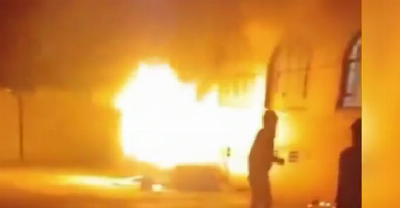Share
Human Rights Voices
While the UN devotes its human rights operations to the demonization of the democratic state of Israel above all others and condemns the United States more often than the vast majority of non-democracies around the world, the voices of real victims around the world must be heard.
Iran, February 2, 2023
‘They Deserve To Die’: Iranian Doctors Who Treated Wounded Protesters ‘Arrested, Tortured’
Original source
In late November, three Iranian doctors traveled to the country's western Kurdistan region, the epicenter of ongoing antiestablishment protests, to help treat wounded demonstrators.
But within days of their arrival, the medical professionals were arrested on security charges. Before they were released on bail last month, the three men were tortured in custody, informed sources told RFE/RL.
The men were charged with "disrupting national security" and "committing crimes against the country's internal and external security" due to their attempts to treat "rioters," a term the authorities have used to refer to antiestablishment protesters.
Yaser Rahmanirad, a general practitioner from the western city of Khorramabad; Behnam Ohadi, a psychiatrist from Tehran; and Homayoun Eftekharnia, an anesthesiologist from the capital, could face lengthy prison terms if found guilty.
They are among the dozens of medical workers who have been arrested for taking part in the protests or treating demonstrators wounded in the state crackdown.
The authorities have killed hundreds of protesters and arrested thousands of people since the demonstrations erupted in September.
The protests are the biggest threat to Iran's clerical establishment in years.
Kurdistan has been the scene of some of the deadliest crackdowns by the authorities, who have deployed heavily armed troops to the region and used live ammunition against protesters. Many demonstrators injured in the clampdown have refused to be taken to a hospital for fear of arrest.
Solitary Confinement
On November 30, Rahmanirad, Ohadi, and Eftekharnia headed to the city of Saghez, the hometown of Mahsa Amini, the 22-year-old woman whose death after her arrest by Iran's morality police triggered the nationwide protests.
After treating several people and distributing medicine to those in need in Saghez, located in Kurdistan Province, the three doctors travelled to neighboring West Azerbaijan, another province with a significant Kurdish population.
Just hours after arriving in the city of Mahabad on December 3, the doctors were arrested by security forces, who seized their medicine and equipment. They were then taken to prison, where they were subjected to torture, informed sources said.
The three men were held in solitary confinement for more than a month and subjected to sleep deprivation, the sources said. The interrogators also falsely told them that their family members had been killed, in an attempt to break them, the sources added.
After hours of interrogations, the men were exposed to bright lights and loud sounds, including the Islamic call to prayer, to prevent them from sleeping, the sources said.
One of the interrogators told them that "those opposing the Islamic establishment deserve to die because if they receive treatment they will again engage in riots," one of the sources told RFE/RL.
Another interrogator said that by attempting to treat injured protesters themselves, the doctors had undermined trust in state health facilities and spread "propaganda against the establishment," the source said.
Interrogators also accused Rahmanirad, a former student activist who had been arrested in the past, of having ties to exiled Kurdish opposition groups that the authorities have blamed for the unrest in Kurdistan, the sources said.
'Constantly Watched'
Rahmanirad, Ohadi, and Eftekharnia are among the dozens of doctors, nurses, and other medical workers arrested during Iran's crackdown on the antiestablishment protests.
Homa Fathi, a Canada-based activist and member of the International Iranian Physicians and Healthcare Providers Association, told RFE/RL that she had documented the arrests of at least 53 medical workers as well as 54 medical students during the crackdown.
Fathi said the majority had been released on bail, but added that the real number of those arrested is likely to be much higher.
"They don't have a good situation," she said. "Some have been [prevented] from working. They're being constantly watched."
Last month, the France-based Kurdistan Human Rights Network reported that Mohsen Sohrabi, a doctor at a hospital in the western city of Sanandaj, had gone missing a day after being summoned by security officials. Sources said Sohrabi had been repeatedly threatened by security officials.
In December, Aida Rostami, a doctor who allegedly treated injured protesters in Tehran's Ekbatan neighborhood, died under mysterious circumstances. The authorities said she had fallen off a pedestrian bridge following an argument with a man who was later arrested. Other sources said she was targeted by security forces.
Also in December, Iran sentenced to death Hamid Qarahasanlou, a radiologist who had been involved in charity work, over the killing of a member of the security forces during protests in the city of Karaj. Later in January, Qarahasanlou's death sentence was overturned due to flaws in the investigation and amid protests by the international medical community.
In November, reports emerged that Shoresh Heydari, a pharmacist in the city of Bukan in West Azerbaijan Province, had been arrested.
The Kurdistan Human Rights Network said Heydari had offered medical tips to protesters on his Instagram page. Another source said the pharmacist had also treated protesters.
In October, security forces in Tehran used tear gas to prevent a protest by health workers, who were calling for an end to the state crackdown and the misuse of ambulances for holding and transferring detained protesters.

